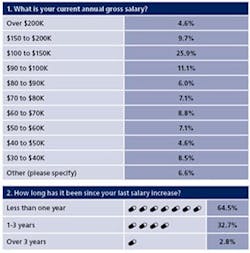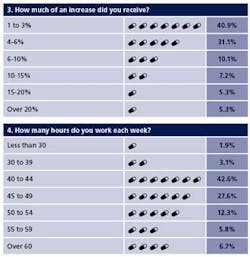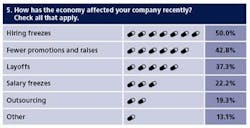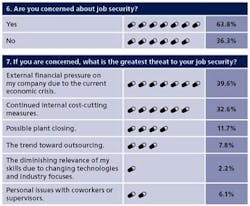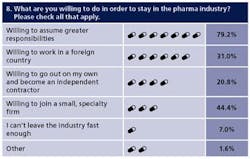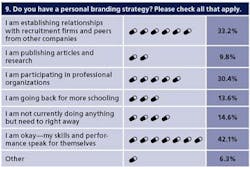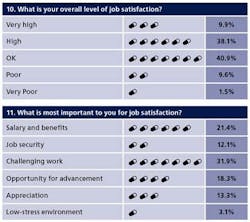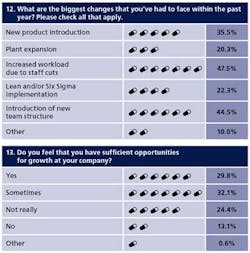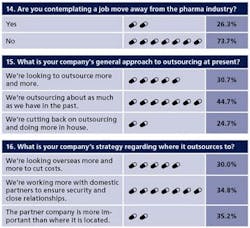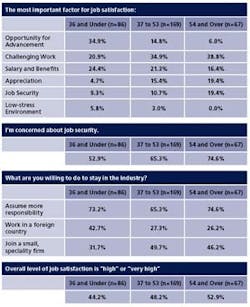|
Blasts from the Past: Previous Survey Results & Commentary |
President Bill Clinton famously harped, “It’s the economy, stupid!” With global markets swooning and entire industries in peril, it’s easy to assume that pharma’s recent spate of layoffs and restructurings are to be blamed on, yes, the stupid economy.
Shrewd observers of the pharma and biopharma job market, however, sing a different tune: It’s just pharma being pharma, they say. Old ways, and old companies, are crumbling. In their place are a combination of merger-borne behemoths (e.g., the new Pfizer-Wyeth) and smaller niche operations.
“While the economy certainly has an impact on the pharmaceutical industry, the layoffs that are occurring now are nothing new,” says Michael Steiner, head of the pharmaceutical group at RegentAtlantic Capital (Morristown, N.J.).
From 2003 to 2006, says Steiner, some 86,000 pharmaceutical jobs were lost in the U.S. “What we’re experiencing now is more of the continuation, if not acceleration, of a trend that the industry is facing,” he says.
“I don’t believe more companies are laying off now than a few years ago,” agrees Megan Driscoll, President of PharmaLogics Recruiting (Braintree, Mass.), a firm that specializes in R&D and manufacturing employment in pharma and biopharma.
Instead, what we’re seeing now is extreme caution on the part of employers.
“Hiring freezes are much more prevalent these days,” Driscoll notes. “Everyone is taking a wait-and-see attitude” to see just how dire the economic situation is, and what the continued fallout will be from blockbuster drug patent expirations, dwindling product pipelines, and the ongoing frenzy of mergers and acquisitions.
The numbers from Pharmaceutical Manufacturing’s 2009 Salary and Job Satisfaction Survey bear this out: Half of all respondents to this year’s survey said that their company had enacted recent hiring freezes (Figure 5).
This is up approximately 5% over one year ago, and 10% over 2007.
Economy or not, today’s job market for the worker is still a case of picking your poison.
As the survey shows, your concerns range from economic instability to corporate cost-cutting and downsizing to outsourcing to plant closings.
“Everyone knows someone who has lost their job,” says Carl Martin, a senior recruiter with Shire Genetic Therapies (Cambridge, Mass.).
“Everyone should feel fortunate that they have a job in this climate—regardless of level or title.”
Rising Tide of Insecurity
You get a good sense of a creeping unease when looking at year over year numbers in our survey.
Of the 371 of you who took the survey this year, 64% said that you were concerned about job security.
This compares with 55.8% a year ago, and 42.7% in 2007, the first year we asked you this question directly.
As a way of compensating for the uncertainty, you’re taking on more work. Our numbers show that, while you’re more than willing to take on added responsibility (a whopping 80%!—see Figure 8), your companies are more than willing to give it.
Nearly half of you (47.5%) said that you’ve had to take on an increased workload due to staff cuts (Figure 12). This is also up about 5% over a year before, and 10% from two years ago.
“Employees really have no choice but to pick up the work!” says Martin. The continued pressure takes its toll, you told us. A sampling of your comments:
- “With fewer opportunities comes insecurity and undermining by peers and coworkers.”
- “The elimination of headcount is putting more burden on the employees we have left.”
- “We’re doing more with less time with overloaded workers. This cannot give good results; “safe” and “hurry” don’t go together.”
Despite all the bad news, you are still relishing your work and enjoying your time in the pharmaceutical industry.
Many of you took the time to comment on how much you appreciate the challenge of what you do.
You still love your jobs, and love working in the drug industry. A few of the things that turn you on (verbatim):
- Improving patients’ lives
- The work—the ability to do good science
- Exceptional coworkers and management
- Making improvements to our processes
- Managing projects on my own
- Getting things done
- Every day is different and I learn something new
- The fact that workers are always appreciated
- Leading a team under economic crisis
- Having my position eliminated and successfully bidding for a new position
What turns you off?
- My own personal limitations
- The routine
- Bureaucracy
- Lack of empowerment and recognition
- Politics and back-stabbing
- Extreme stress from an uncertain future
- No opportunities for growth
- Mired in maintaining rather than innovating
- Cuts are coming
Eroding Salaries, Research Layoffs
Let’s face it, one of the reasons you got into this line of work was the pay and perks. While you’re still getting your annual, or perhaps semi-annual, pay increases—Figures 2 and 3’s numbers are in line with those of previous years—current gross salary statistics are a bit troubling: 40.2% of our respondents this year said that they were making over $100K annually (Figure 1). This compares to 47.3% in 2008. Larger percentages of you are making in the neighborhood of $30K to $50K. This could imply a few things: there are more low-paying jobs out there, or more part-time and contract work going on. Or maybe the price that some of you command has gotten too dear. “The more expensive people are getting targeted first,” one of you lamented.
In other words, it’s not just the low-paying jobs that are being outsourced. “The goal of our company is to outsource design engineering to India within five years,” another respondent said.
Because outsourcing continues to be an increasingly common (and controversial) practice, we decided to dig a bit deeper this year with our questions in this area (Figures 15 and 16). It’s intriguing that while 30% of your companies are outsourcing more than in the past, about one-quarter of your firms are outsourcing less, suggesting divergent strategies. As Figure 16 illustrates, roughly one-third of your companies continue to head overseas and are offshoring key responsibilities more, while a third are looking closer to home for partners. The remaining third say it’s not about location but about partners’ competency and staying power.
“It's all about solvency,” one of you wrote. “You only want partners capable of surviving this economic downturn.”
Both Driscoll and Steiner see Research as the hardest hit career area of late. Pfizer and other high-profile firms are laying off discovery and early-phase staff in bunches, but prioritizing those workers with expertise in development, tech transfer, and Quality.
“The timing would appear to be rather curious,” says Steiner, “considering the void in the current pipeline and the need to generate new products. However, one of the trends that many big companies are embracing is shifting more of their drug discovery and early-stage development to external resources.”
What jobs are hot? Tech transfer, project and clinical trial management, QA, QC, regulatory, validation, and analytics are all strong areas right now. “I commonly hear, ‘I’m hiring a tech transfer person because we have quality issues,’” Driscoll says. These people are often good communicators who break down silos and bridge gaps between groups within the same building, and especially across languages and continents. “There’s a need for people who can increase the level of communication between companies and their outsourcing partners,” she says.
Researchers and others whose jobs have been outsourced can take heart in the fact that the pendulum will eventually swing back in their direction, and that those jobs being outsourced are not necessarily “disappearing” overseas. They’re often going to nearby contract manufacturers or start-up companies that are hungry for qualified scientists with pharmaceutical backgrounds. It’s heartening to note that several of you indicated that you had recently decided to go it alone and begun your own start-ups—bravo.
Branding: Think Small and Broad
In this environment of eroding stability, you’re best to be wary. Even those who feel most secure may have another thing coming. Driscoll cautions those—such as the 42% of respondents to our survey—whose “skills and performance speak for themselves” and do not have a clear professional branding strategy. “They need to change that mindset,” she says. “Most times, their perception of themselves is higher than others’ perceptions of them.”
As many employees of Pfizer, GSK, Merck and other major manufacturers well know, size does not mean security. “Ultimately, the loyalty only goes in one direction,” says Driscoll. Job security has nothing to do with whether you work for a big company or small, branded, generic, or contract firm. It has to do with your own skills and relevance. “Big Pharma candidates are often very much one-track people—they excel in one thing,” she continues. “Candidates who’ve worked for contract organizations have a breadth of skills they might not have gotten in a larger environment.”
In the comments we received with our data, many of you indicated some proactive career building. You’re going back to school, getting more Lean and Six Sigma training, networking with old contacts and meeting new ones through the likes of LinkedIn and Innocentive, and seeking our mentors.
- I am immersing myself in cutting-edge technology at multiple international sites
- Just completed Quality and Regulatory certification program
- Building relationships with external manufacturers and suppliers
- Keep a good attitude every day I go to work
These are people that have the right idea. Career advice is plentiful (see box below), but as you continue down your professional path, remember that it’s important what you know, and who you know. “Understand that the old reality of long-tenured, stable careers with a single company is gone,” one of you wrote. “Networking is the single most important job skill to develop and exercise. The industry is very tight and it is not uncommon to come across the same individuals many times over the years.”
“Keep a positive attitude and don't burn any bridges,” another grizzled veteran advised, “because you never know who your manager down the line will be.”
Age Before Duty?
How much can you tell about a generation’s work ethic by statistics? While numbers can be deceiving, we can make several broad assumptions by breaking down survey results according to three different age groups.
Young Guns (36 and Under)
What matters to the younger generation of pharma employees is opportunity, not praise and security. Travel and overseas living? Fine. They’ve got the web to stay in touch. Extra responsibility and longer hours are fine, too, as long as they’ve got a solid paycheck.
Mid-lifers (37 to 53)
Let’s face it, a large segment of this population has kids and concerns over salary and job security are real and prominent. Nevertheless, it’s good to know that this group values challenging work, and would gladly take on more responsibility and give it a go at a small, specialty firm.
Greatest Generation (54 and Over)
Older does not always mean stubborn and set in their ways. This group values challenge and job satisfaction, though career security concerns increase as retirement draws near. Perhaps that’s why this group is open to joining a smaller firm if it means having a job.

